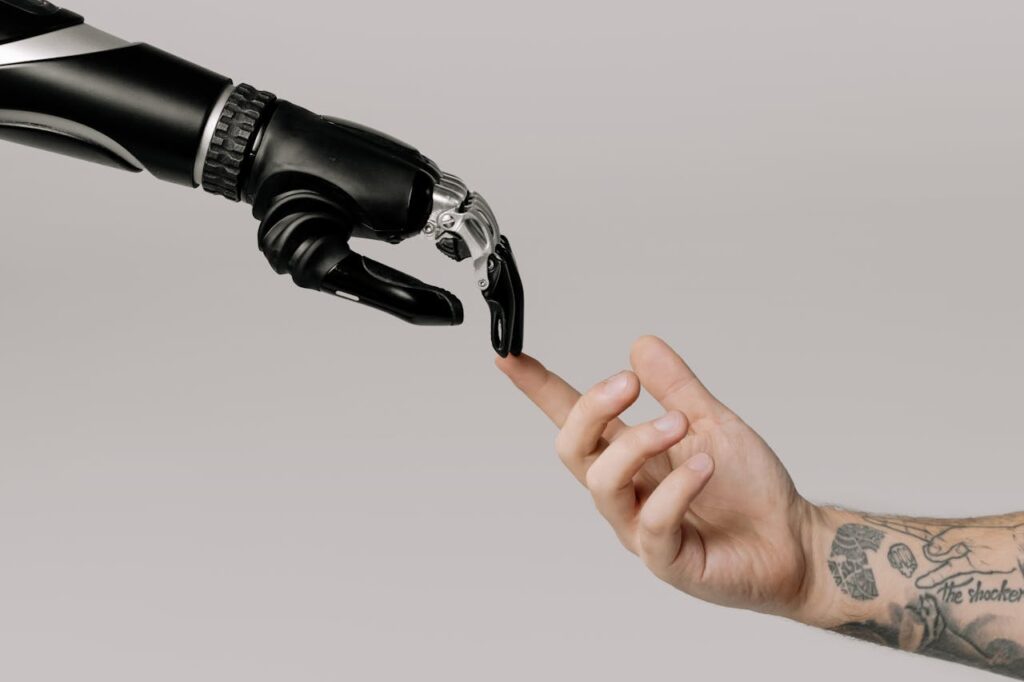5 Game-Changing AI Solutions Revolutionizing Healthcare Industry
Artificial Intelligence (AI) is transforming the healthcare industry, offering innovative solutions to long-standing challenges. The impact of AI in healthcare is becoming increasingly evident, from improving patient care to streamlining administrative tasks. This technology is revolutionizing how healthcare professionals approach their work and how patients receive care.
In this article, we’ll explore five key areas where AI solutions are making a significant difference in healthcare. We’ll dive into the problems AI is solving and how these advancements are shaping the future of medicine. From enhancing medical diagnoses to revolutionizing drug discovery, AI is at the forefront of healthcare innovation. So, let’s jump in and discover how AI is changing the game in healthcare, and what this means for patients, healthcare providers, and the industry as a whole!
- Enhancing Medical Diagnosis
- Revolutionizing Drug Discovery
- Transforming Patient Experience
- Streamlining Administrative Tasks
- Advancing Medical Research
Enhancing Medical Diagnosis
One of the most exciting areas where AI is making waves is in medical diagnosis. Let’s explore how AI is helping healthcare professionals spot issues faster and more accurately.
Spotting the Invisible: AI-Powered Imaging Analysis
AI algorithms are now capable of analyzing medical images with incredible precision. For instance, AI can detect tiny abnormalities in X-rays, MRIs, and CT scans that might be missed by the human eye. This means potential problems can be caught earlier, leading to better outcomes for patients. The technology is particularly promising in fields like radiology and pathology, where visual analysis plays a crucial role in diagnosis.
The speed at which AI can process these images is also remarkable. While a radiologist might take several minutes to analyze a single image, AI can process hundreds of images in the same time frame. This efficiency allows for quicker diagnoses and faster treatment initiation, which can be critical in time-sensitive conditions. Moreover, this rapid processing capability can help address the growing demand for medical imaging services, potentially reducing wait times for patients and easing the workload on healthcare professionals.
Moreover, AI doesn’t get tired or distracted like humans do. It can maintain consistent accuracy even when processing large volumes of images, reducing the risk of human error in image interpretation. This consistency is particularly valuable in high-pressure medical environments where fatigue can impact performance. By serving as a reliable second set of „eyes,” AI can help ensure that critical details aren’t overlooked, potentially improving diagnostic accuracy and patient safety.
Lastly, AI imaging analysis is continually improving through machine learning. As these systems analyze more images, they become even better at detecting abnormalities, potentially surpassing human capabilities in some areas of image analysis. This ongoing improvement means that the technology’s impact on healthcare is likely to grow over time. As AI systems become more sophisticated, they may be able to detect patterns or anomalies that are not yet recognized by human experts, potentially leading to new insights and breakthroughs in medical imaging.
The Digital Doctor’s Assistant: Symptom Checkers
AI-powered symptom checkers are becoming increasingly sophisticated. These tools can help both patients and doctors by suggesting possible diagnoses based on reported symptoms. While they’re not meant to replace professional medical advice, they can serve as a helpful first step in the diagnostic process. These digital assistants use complex algorithms to analyze symptoms and medical histories, providing a list of potential conditions and recommended next steps.
For patients, these symptom checkers can provide peace of mind or encourage them to seek medical attention when necessary. They can help distinguish between minor ailments that can be treated at home and more serious conditions requiring professional care. This can be particularly useful in reducing unnecessary doctor visits for minor issues, while also ensuring that people don’t ignore potentially serious symptoms. Additionally, these tools can help educate patients about their health, providing them with reliable information and empowering them to take a more active role in their healthcare.
For doctors, AI symptom checkers can serve as a valuable second opinion. They can suggest diagnoses that a doctor might not have initially considered, potentially leading to more accurate and comprehensive patient assessments. This can be especially helpful for rare or complex conditions that a general practitioner might not encounter frequently. By providing a comprehensive list of potential diagnoses based on the latest medical knowledge, these tools can help doctors make more informed decisions and potentially reduce misdiagnoses.
Additionally, these tools can help prioritize patients in emergency settings. By quickly assessing symptoms, they can help identify critical cases that need immediate attention, improving overall patient care in busy healthcare environments. This triage function can be particularly valuable in emergency rooms or during public health crises, where healthcare resources may be stretched thin. By helping to allocate resources more efficiently, AI symptom checkers can contribute to better overall patient outcomes and more effective healthcare delivery.
Predicting Health Risks: AI-Driven Risk Assessment
By analyzing vast amounts of patient data, AI can predict potential health risks before they become serious problems. This proactive approach allows for early intervention, potentially preventing diseases or catching them in their earliest stages. AI risk assessment tools can process and analyze data from various sources, including electronic health records, genetic information, lifestyle data, and even environmental factors, to create a comprehensive risk profile for each patient.
AI risk assessment tools can consider a wide range of factors, including genetic predispositions, lifestyle choices, environmental factors, and medical history. This comprehensive analysis provides a more holistic view of a patient’s health risks than traditional methods. By considering such a broad range of factors, AI can identify complex patterns and relationships that might not be apparent through conventional risk assessment methods. This can lead to more personalized and accurate risk predictions, allowing for truly individualized preventive care.
These predictive models can be particularly useful in managing chronic diseases. For instance, AI can predict when a patient with diabetes might be at risk of complications, allowing for timely interventions. By continuously monitoring patient data and updating risk assessments in real-time, AI can help healthcare providers stay one step ahead of potential health issues. This can lead to more proactive and effective management of chronic conditions, potentially improving patient quality of life and reducing the need for emergency interventions.
Furthermore, AI-driven risk assessment can help in population health management. By identifying trends and risk factors across large groups, healthcare providers and policymakers can implement targeted preventive measures to improve overall community health.
Revolutionizing Drug Discovery
AI is making significant strides in the world of drug discovery and development, potentially speeding up the process of bringing new treatments to patients. Let’s explore how AI is transforming this critical area of healthcare.
Speeding Up the Process: AI in Drug Development
Traditionally, drug development has been a slow and expensive process, often taking more than a decade and billions of dollars to bring a new drug to market. AI is changing that by rapidly analyzing molecular structures and predicting how they might interact with various diseases. This speeds up the initial stages of drug discovery dramatically, potentially reducing the time and cost involved in developing new treatments.
AI algorithms can sift through vast databases of chemical compounds, identifying those with the highest potential for treating specific diseases. These systems can predict how different molecules might bind to target proteins in the body, a crucial step in drug development. By automating this process, AI can evaluate millions of potential drug candidates in a fraction of the time it would take human researchers.
Moreover, AI can help optimize the design of new drugs. By analyzing the structure of successful drugs and comparing them to less effective ones, AI can suggest modifications that might improve a drug’s efficacy or reduce its side effects. This iterative process can lead to the development of more effective and safer medications.
AI is also being used to repurpose existing drugs for new treatments. By analyzing the molecular structure and known effects of approved drugs, AI can predict whether these medications might be effective against other diseases. This approach could significantly reduce the time and cost of bringing new treatments to patients, as repurposed drugs have already passed safety tests.
Personalized Medicine: Tailoring Treatments with AI
AI is helping to move healthcare towards more personalized treatments. By analyzing a patient’s genetic makeup, medical history, lifestyle factors, and other relevant data, AI can help predict which treatments are likely to be most effective for each individual. This approach, known as precision medicine, has the potential to significantly improve treatment outcomes and reduce adverse reactions.
AI algorithms can process vast amounts of genomic data, identifying genetic variations that might influence how a patient responds to different treatments. This information can help doctors choose the most appropriate medications and dosages for each patient, potentially improving efficacy and reducing side effects.
In oncology, AI is being used to analyze tumor genetics and recommend personalized treatment plans. By comparing a patient’s tumor profile with databases of treatment outcomes, AI can suggest the most promising therapies based on the specific characteristics of the cancer. This approach could lead to more effective cancer treatments and better patient outcomes.
Furthermore, AI can help monitor treatment effectiveness in real-time, allowing for quick adjustments to a patient’s care plan. By continuously analyzing patient data, including vital signs, lab results, and even data from wearable devices, AI can alert healthcare providers to potential issues or suggest modifications to improve treatment efficacy.
Clinical Trial Optimization: AI’s Role in Research
AI is also streamlining the clinical trial process, potentially accelerating the development of new treatments. It can help identify suitable candidates for trials, predict potential side effects, and even suggest modifications to trial designs for better results.
One of the biggest challenges in clinical trials is recruiting suitable participants. AI can analyze patient records to identify individuals who meet the specific criteria for a trial, potentially speeding up the recruitment process. Additionally, AI can help ensure diversity in trial participants by identifying underrepresented groups, leading to more comprehensive and reliable trial results.
During the trial, AI can continuously monitor and analyze data in real-time. This capability allows researchers to identify trends or potential issues early, potentially improving patient safety and the overall success of the trial. AI can also help in detecting subtle patterns in the data that human researchers might miss, potentially leading to new insights about the treatment being studied.
AI is also being used to optimize the design of clinical trials. By analyzing data from previous trials, AI can suggest the most effective protocols, optimal sample sizes, and the most relevant endpoints to measure. This can lead to more efficient and cost-effective clinical trials, potentially accelerating the drug approval process.

Transforming Patient Experience
AI is not just working behind the scenes – it’s also directly improving the patient experience in several ways. From virtual health assistants to remote monitoring systems, AI is making healthcare more accessible and patient-centered.
Virtual Health Companions: AI Chatbots and Assistants
AI-powered chatbots and virtual assistants are providing 24/7 support to patients. They can answer common questions, provide medication reminders, and even offer mental health support. These digital companions are making healthcare more accessible and convenient for patients.
These AI assistants can handle a wide range of tasks, from scheduling appointments to providing basic health information. They can answer questions about symptoms, medication side effects, or general health concerns, providing patients with reliable information at any time of day. This constant availability can help reduce anxiety and improve patient satisfaction.
For patients with chronic conditions, AI assistants can provide regular check-ins and reminders. They can prompt patients to take their medications, record symptoms, or perform necessary health checks. This ongoing support can help improve treatment adherence and overall health outcomes.
In the mental health field, AI chatbots are being used to provide cognitive behavioral therapy and other forms of psychological support. While not a replacement for human therapists, these AI companions can offer immediate support and coping strategies, potentially helping to bridge the gap in mental health care access.
Smart Scheduling: AI-Powered Appointment Systems
Healthcare automation through AI solutions is revolutionizing appointment scheduling and management. These artificial intelligence systems can find optimal times for both patients and healthcare providers, reducing wait times and improving efficiency. By considering factors like patient preferences, provider availability, and even traffic patterns, AI solutions can optimize scheduling to minimize delays and no-shows.
These smart scheduling systems, powered by diagnostics with AI, can also prioritize appointments based on urgency. By analyzing patient data and reported symptoms, artificial intelligence can help ensure that patients with more pressing health concerns are seen sooner. This application of healthcare automation can lead to better health outcomes and more efficient use of healthcare resources.
AI scheduling systems, a key component of artificial intelligence solutions in healthcare, can also send reminders and follow-ups to patients, reducing the likelihood of missed appointments. These reminders can be personalized based on patient preferences, whether that’s a text message, email, or phone call. Some advanced AI solutions can even engage in two-way communication, allowing patients to confirm, reschedule, or ask questions about their appointments.
Moreover, healthcare automation can help with resource allocation within healthcare facilities. By predicting patient flow and appointment durations, these AI-powered systems can help healthcare providers optimize their schedules and staffing levels. This application of AI solutions can lead to shorter wait times and a better overall experience for both patients and healthcare professionals, demonstrating the transformative power of artificial intelligence in healthcare management.
Remote Monitoring: Keeping Patients Safe at Home
With AI-powered remote monitoring systems, healthcare providers can keep track of patients’ health from the comfort of their own homes. This is particularly beneficial for managing chronic conditions and reducing unnecessary hospital visits. These systems can collect and analyze data from various sources, including wearable devices, smartphone apps, and home health monitors.
For patients with conditions like diabetes or heart disease, remote monitoring can provide continuous tracking of vital signs and other important health metrics. AI algorithms can analyze this data in real-time, alerting healthcare providers to any concerning changes or trends. This early warning system can allow for timely interventions, potentially preventing complications and reducing the need for emergency care.
Remote monitoring can also improve the quality of life for many patients. By reducing the need for frequent in-person check-ups, these systems can save patients time and reduce the stress associated with hospital visits. For elderly patients or those with mobility issues, remote monitoring can provide a sense of security and independence, knowing that their health is being continuously monitored.
Furthermore, AI-powered remote monitoring can help healthcare providers manage their patient populations more effectively. By providing a constant stream of health data, these systems allow for more proactive and personalized care. Healthcare providers can use this information to adjust treatment plans, schedule follow-ups, or provide timely advice, all without the need for an in-person visit.
Streamlining Administrative Tasks
AI isn’t just about clinical applications – it’s also making a big difference in healthcare administration. By automating routine tasks and improving efficiency, AI is helping to reduce costs and free up healthcare professionals to focus more on patient care.
Paperwork Be Gone: AI in Medical Record Management

AI is helping to organize and manage the vast amounts of data in electronic health records (EHRs). This makes it easier for healthcare providers to access the information they need quickly and accurately, improving patient care and operational efficiency.
Natural Language Processing (NLP) algorithms can read and interpret unstructured data in medical records, such as doctor’s notes or patient narratives. This allows for faster and more accurate information retrieval, potentially reducing the time healthcare providers spend searching for relevant patient information.
AI can also help in maintaining the quality and consistency of medical records. It can flag potential errors or inconsistencies in the data, ensuring that patient records are accurate and up-to-date. This is crucial for providing safe and effective care, as well as for billing and regulatory compliance.
Moreover, AI can assist in data integration, combining information from various sources into a comprehensive patient profile. This can include data from different healthcare providers, wearable devices, and even genetic information, providing a more holistic view of a patient’s health status and history.
Billing Made Easy: AI-Assisted Coding and Billing
Medical billing and coding can be complex, but AI is simplifying the process. AI systems can automatically code medical procedures and diagnoses, reducing errors and speeding up the billing process. This not only improves efficiency but also helps ensure more accurate reimbursement for healthcare providers.
AI algorithms can analyze clinical documentation and assign appropriate billing codes based on the services provided. This can help reduce coding errors that might lead to claim denials or delayed payments. By improving coding accuracy, AI can help healthcare providers maximize their reimbursements and reduce revenue loss.
These AI systems can also stay up-to-date with the latest billing regulations and code changes, ensuring compliance with evolving healthcare policies. This can be particularly valuable in navigating the complex landscape of insurance requirements and government regulations.
Furthermore, AI can assist in fraud detection by identifying unusual billing patterns or discrepancies. This can help healthcare organizations maintain financial integrity and comply with regulatory requirements, potentially avoiding costly audits or penalties.
Resource Allocation: AI-Optimized Hospital Management
Healthcare automation powered by AI solutions is revolutionizing how hospitals manage their resources. From predicting patient admissions to optimizing staff schedules, artificial intelligence is making hospitals run smoother and more cost-effectively.
AI algorithms, a key component of diagnostics with AI, can analyze historical data and current trends to predict patient volumes and resource needs. This application of healthcare automation helps hospitals prepare for busy periods, ensuring they have adequate staff and supplies on hand. Conversely, it can also identify slower periods, allowing for more efficient allocation of resources.
In terms of staffing, artificial intelligence solutions can optimize work schedules based on predicted patient loads, staff skills, and even individual preferences. This can lead to improved staff satisfaction and better patient care by ensuring the right mix of skills is available at all times, demonstrating the practical benefits of AI in healthcare management.
AI solutions can also assist in inventory management, predicting when supplies need to be reordered and in what quantities. This aspect of healthcare automation can help reduce waste and ensure that necessary items are always available when needed, potentially improving patient care and reducing costs. By leveraging these AI-driven insights, hospitals can enhance their operational efficiency and focus more on delivering quality care.
Advancing Medical Research
Finally, AI is pushing the boundaries of medical research, helping to uncover new insights and accelerate scientific discoveries.
Big Data Analysis: Uncovering Hidden Patterns
Healthcare automation through AI solutions is transforming the landscape of medical research by uncovering patterns and insights that humans might miss. By analyzing massive datasets, artificial intelligence solutions are leading to new discoveries in disease prevention and treatment, potentially revolutionizing our understanding of human health.
Machine learning algorithms, a key component of diagnostics with AI, can process and analyze vast amounts of diverse data, including genomic information, clinical trial results, and even data from wearable devices. By identifying correlations and patterns within this data, AI can generate new hypotheses for researchers to explore, opening up new avenues for scientific inquiry.
In epidemiology, AI is being used to track and predict disease outbreaks. By analyzing data from various sources, including social media and weather patterns, AI can help public health officials respond more quickly and effectively to emerging health threats. This application of healthcare automation ensures a more proactive approach to managing public health crises.
AI is also playing a crucial role in genomics research. By analyzing large genomic datasets, AI can help identify genetic factors associated with various diseases. This capability can lead to new treatment targets and personalized medicine approaches, demonstrating the profound impact of artificial intelligence solutions in advancing medical research and improving patient outcomes.
Literature Review: AI-Powered Research Assistants
AI solutions are helping researchers stay up-to-date with the latest findings in their field. Healthcare automation tools powered by artificial intelligence can quickly scan and summarize relevant research papers, saving researchers valuable time and ensuring they don’t miss important developments in diagnostics with AI and other areas.
These AI assistants, part of the broader spectrum of artificial intelligence solutions, can process thousands of scientific papers in minutes, extracting key information and identifying trends or contradictions in the literature. This can help researchers quickly get up to speed on new topics in healthcare automation or identify gaps in current knowledge that might be worth exploring.
Natural Language Processing algorithms, a key component of AI solutions in healthcare, can even understand the context and nuances of scientific writing, allowing these tools to provide more sophisticated analyses. They can identify emerging research trends in diagnostics with AI, connect seemingly unrelated studies, and even suggest potential collaborations between researchers working on similar topics.
Moreover, artificial intelligence solutions can assist in the peer review process by checking for statistical errors, identifying potential conflicts of interest, or flagging plagiarism. This application of healthcare automation can help improve the quality and integrity of published research, particularly in fields related to diagnostics with AI and other medical innovations.
Predictive Modeling: Forecasting Health Trends
Healthcare automation powered by AI solutions is revolutionizing public health planning and resource allocation. By analyzing historical data and current trends, artificial intelligence can predict future health patterns with remarkable accuracy.
AI-driven models can forecast disease outbreaks, enabling health officials to proactively prepare and allocate resources. These sophisticated predictions incorporate a wide range of factors, from climate data and population demographics to social media trends, providing a comprehensive view of potential health risks.
In the realm of clinical research, diagnostics with AI is proving invaluable. Artificial intelligence solutions can predict which patients are most likely to respond to specific treatments or participate in clinical trials. This capability helps researchers design more effective studies and potentially accelerate the drug development process.
Healthcare automation is also being employed to model the potential impacts of public health interventions. By simulating various scenarios, policymakers can leverage AI solutions to make more informed decisions about health policies and resource allocation.
Moreover, artificial intelligence solutions are crucial in predicting long-term health trends, such as the prevalence of chronic diseases or the impact of aging populations. This foresight allows healthcare systems to prepare for future challenges and develop proactive strategies to enhance public health, further demonstrating the transformative power of AI in healthcare.

Conclusion: The AI-Powered Future of Healthcare
As we’ve explored throughout this article, AI is revolutionizing healthcare in numerous ways, from enhancing medical diagnoses to streamlining administrative tasks. These five game-changing AI solutions demonstrate the immense potential of artificial intelligence to transform the healthcare industry. While challenges such as data privacy and ethical considerations remain, the benefits of AI in improving patient outcomes, reducing healthcare costs, and advancing medical research are undeniable. As the technology continues to evolve, we can expect AI to play an increasingly central role in shaping a more efficient and effective healthcare system.
Looking ahead, the key to success will be the thoughtful integration of AI technologies with human expertise. AI is not replacing healthcare professionals but empowering them to provide better, more personalized care. By automating routine tasks, providing data-driven insights, and supporting decision-making, AI allows healthcare providers to focus more on what truly matters – the patients. As we move forward, this collaboration between human knowledge and artificial intelligence will be crucial in creating a healthcare system that is more precise, accessible, and capable of meeting the complex health challenges of the future.



